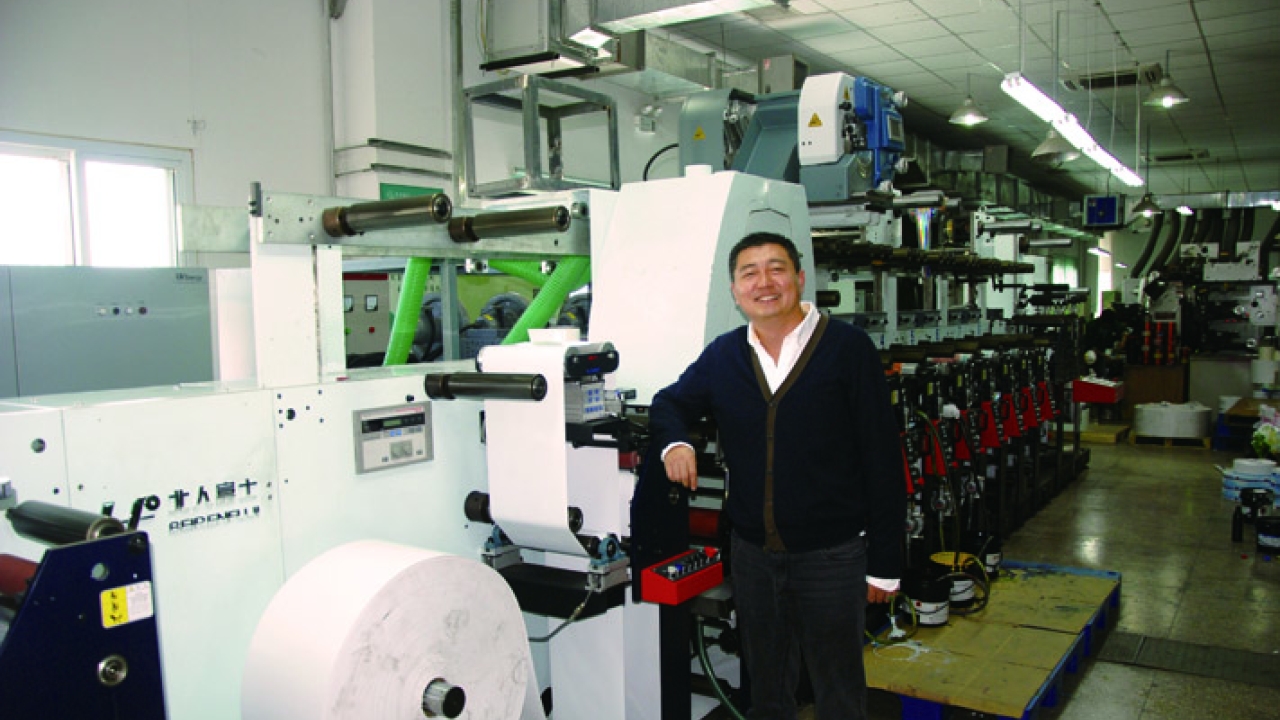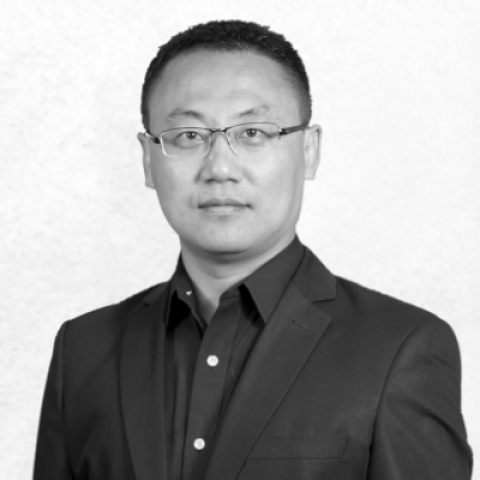Innovation and doing business in China

Leading Chinese converter Beijing Deji Adhesive Labels is focused on selling service, innovation and value – and expects the same from its suppliers. L&L China editor Kevin Liu reports
In the Daxing district of south Beijing, you will find the China Printing Museum, an official museum dedicated to the history of printing, while in the Changping district of north Beijing, you will find a labeling museum owned by a private company which is fully engaged in label production.
In an exclusive interview with Labels & Labeling China, Yu Dayang, the general manager of Beijing Deji Adhesive Labels & Prints ('Beijing Deji'), said his company is very much like a museum.
‘Almost any kind of label printing machines, including letterpress, offset printing, flexo, digital printing or machines with an online post-press system, you can find in our museum. Any information you want to know about current label printing machines, just come here.’
Dayang compares himself to a museum curator – but a curator who needs to pay attention to the development of his business.
No giants here
Beijing, of course, is the national political and cultural center, and its enterprises are focused on hi-tech and cultural production, especially in the Changping Hi-Tech Industrial Park. Almost half of China’s Growth Enterprise Market (GEM)-listed enterprises are located in this district.
Salaries here are highly competitive, which is not an issue for most GEM companies, where salary is a small proportion of the total enterprise cost. But the label printing industry remains a traditional one, where salary takes up a large part of the cost.
‘There is no way for us to compete with them,’ says Dayang. ‘As a label manufacturer looking for further development, we will establish factories in the urban area between Beijing and Tianjin where all costs are comparatively lower than in Beijing. However, I myself love Changping and our employees also have families here. So we recognized we needed to find a way to handle our company’s development in the competitive economic conditions found in Beijing.’
The way forward for Dayang is for Beijing Deji to become a ‘creative quality’ enterprise.
‘We expect to make full use of our design capability and our experience in different label print technologies to provide a unique service for our customers. Our salesmen are also consultants who will introduce customers to the whole process and range of options available to them.’
Dayang does not want to go after small profits through a quick turnover of clients and will never join in a price war.
‘The business we are pursuing is to provide a valuable service to thoughtful customers. When one customer doesn’t need mass-market labels, when he pursues some special effects, when he expects original thinking to be applied to his labels, that is the time we use our expertise.’
Creative enterprise
Beijing Deji expects a win-win co-operation with its customers: customers get their unique labels and Beijing Deji gets reasonable profits. This is the only way a label converter can sustain a prosperous business.
Providing unique label products for customers requires extensive technical support. Beijing Deji houses an excellent label design team which is generously supported by Dayang in terms of software and hardware investment. To realize each design as a converted label requires ‘smart’ combination printing and converting, and the establishment of the 'Labeling Equipment Museum' is an important step in the realization of this vision at Beijing Deji.
The company owns two Labelmen satellite-type letterpress machines, one Weigang offset machine and one Nipson digital printing press; more recently, it purchased one Hontec 9-color satellite type letterpress from Dongguan and one Beiren Fuji flexo machine. In addition, Beijing Deji has an extensive ability to post-print labels.
‘Except for those obsolete intermittent label printing machines, our current equipment covers all the current main print technologies,’ said Dayang. ‘We use different processes to produce different types of label products and we try to realize some special process effects with using combinations of print processes.’
Following Dayang’s initiatives, the offset presses are now engaged in converting wine labels; digital print systems are used mainly for the business forms and logistics management labels; letterpress mainly for middle/long-run printing; and flexo presses mainly for long-run printing.
‘Take the satellite type 9-color letterpress for example. Our workers operate it quite expertly and the speed of exchanging printing plates is also very fast. Therefore we can use the satellite type letterpress for short-run printing. When we introduced the Hontec letterpress from Dongguan we modified this new equipment by adding online die-cutting, hot foiling and screen. We do not simply install equipment – we also try to extend its functionality and enhance automation.’
Labels converting covers such an extensive field that nobody can know everything. Therefore, experience, creativity and a choice of process methods are always necessary. ‘Our solutions are not simply copies but products with intelligence inside,’ says Dayang.
Standard equipment is far from meeting Dayang’s requirements and he expects his facilities to offer unique technology solutions. In 2011, Beijing Deji concluded a cooperation agreement with Beiren Fuji, which gave Dayang the space to implement his ideas.
‘We bought the Beiren flexo machine as a kind of cooperative R&D project rather than a simple purchase. It is the first such machine being launched by Beiren on the Chinese market for the label industry.
‘Beiren is an excellent joint venture partner which has won many prizes, which indicates that this is a strong technology enterprise. Yet in our opinion, they also have a lot to improve in the field of flexo printing and should focus more on their customers’ special requirements. Our chief engineer worked for United Printing (the agent of Mark Andy in China) beforehand and he is quite familiar with the detailed technology of flexo printing manufacturers. Following his suggestion, we decided to work with Beiren.
‘In this cooperation, we provided many exact opinions for Beiren Fuji including the process combination, color match tests for the machines and some detailed improvement points. They in turn feel pleased about this cooperation because they can develop products closely matched to market requirements and they start to understand what the market really needs.
‘If we had cooperated with some internationally famous corporations, the customized machine would be quite expensive, which is difficult for our private enterprise in the short term. But for now, it makes us happy to realize our creativity in this machine based on our experience.’
As a benchmarking exercise, the cooperation between Beijing Deji and Beiren Fuji attracted widespread attention among printing enterprises in the Beijing area. Not long after this flexo press was commissioned by Beijing Deji, other converters looked to Beiren Fuji for a machine with the same configuration.
Dayang gave these companies pertinent advice based on his experience: ‘Do make a cautious consideration of your business and process control before the purchase, otherwise, there may be process conflicts which will lower the production efficiency and you will be unable to show the real efficacy of this machine.’
Dayang believes that label converters in China need to address questions of efficiency if they are to remain profitable. ‘Compared with the extravagant profits at the beginning of the (PS label) era, the profitability of the labeling industry is indeed getting reduced – although compared with the general printing and newspaper industry, to some extent label printing is returning to a reasonable level. Only if an enterprise has its own specialty can label printing still be quite profitable.’
The motto summarizing the corporate culture of Beijing Deji is: 'Specialized in technique, Honesty in my heart'. ‘We seek to combine intelligence and ability, honesty and thoughtfulness. As long as our product is close to this target, we believe customers will also like to pay for your product’s quality and design, for the special value therein. In a word, the label industry is still prosperous,’ says Dayang. Looking towards the future, what is Dayang’s take on digital printing? ‘We believe printing will be digitalized finally though we are not sure about the time frame. Like a craftsman, we will follow the digital journey but based on our traditional experience, which is my favorite role.’
Today, Beijing Deji has become a beacon in the Chinese labels and labeling industry, offering an example which combines perfect culture, creativity and technology. If you are at a loss how to reach the development target of your company, maybe you can have a talk with Dayang, the curator of this ‘labeling equipment museum’, who may well be able to enlighten you.
Pictured: Yu Dayang, general manager of Beijing Deji Adehsive Labels & Prints
This article was published in L&L issue 6, 2011
Stay up to date
Subscribe to the free Label News newsletter and receive the latest content every week. We'll never share your email address.

